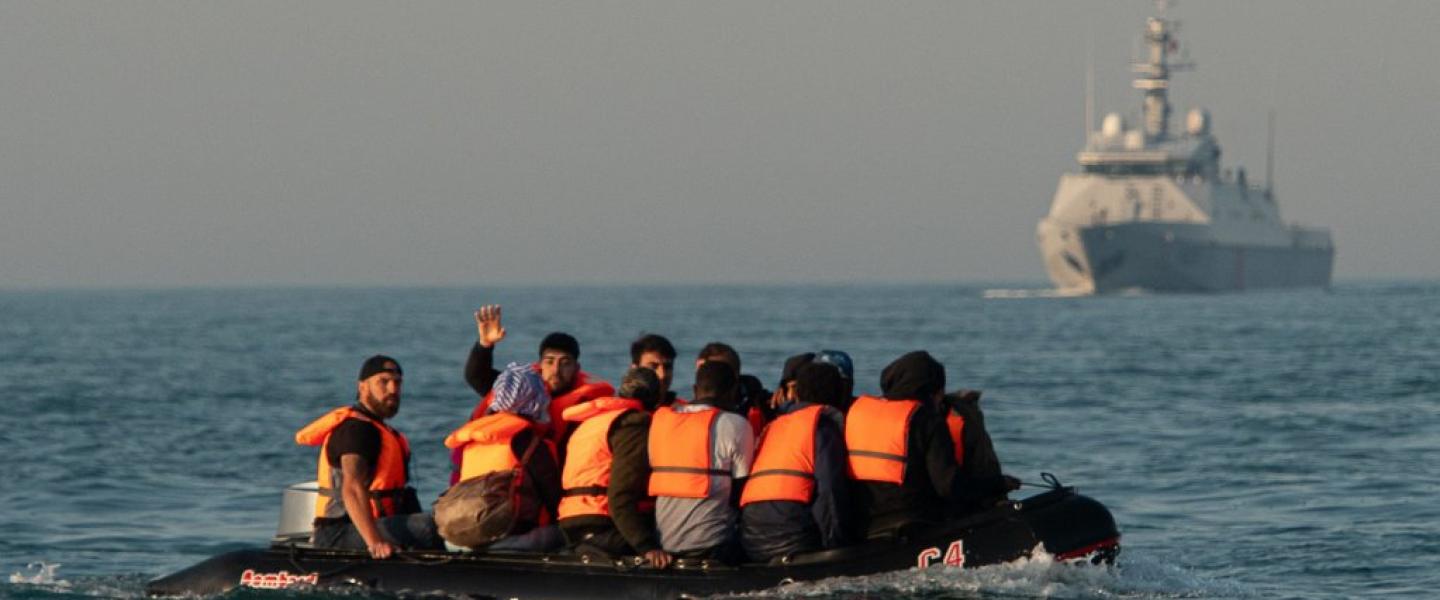Press Release
11 July 2021
“We are confident the approach we have agreed today strikes a proportionate balance between deterring criminal gangs from attempting dangerous crossings and acting in the interests of justice and compassion.”
Photo Credit: September 2020 | Photo: picture-alliance/P. Bonniere
London. UK. In respect of the ongoing English Channel migrant crossing situation, the UK Crown Prosecution Service (CPS) issued a statement on Thursday 8 July 2021 confirming that asylum seekers entering the UK illegally would no longer be prosecuted unless they have been involved in other criminal activity. The position taken is at odds with the UK Home Office and the UK Home Secretary Piri Patel’s attempts to bring into force the Nationality and Borders Bill released on Tuesday 6 July.
Patel has described the proposed legislation as “the biggest overhaul of the UK’s asylum system in decades” but which was challenged by campaigners as an ‘anti-refugee bill’ with proposals restricting international protections and in some cases criminalising those seeking to secure their rights and futures.
Commentators have questioned if there is a ‘crisis’ in the first instance, and that the suggested ‘crisis’ is a deliberate political construct with Patel staking her political career on the Bill.
The new Bill also proposes to amend section 77 of the Nationality, Immigration and Asylum Act 2002 to make it possible to remove someone to a safe third country whilst their asylum claim is pending thereby externalising State responsibilities.
CPS Guidance
The CPS published its updated guidance for handling of illegal entry cases via small boats, setting out the circumstances when criminal charges may be considered for those bringing migrants to the UK while posing a risk to their lives. The approach was stated as being agreed following close consultation between the CPS, Home Office (Immigration Enforcement and Border Force), the National Crime Agency and policing.
Key points of note are:
- Guidance confirms that individuals who have played a significant role in people-smuggling – including those who organise and pilot dangerous boat crossings across the English Channel – can expect to face prosecution where this is supported by the evidence.
- Guidance recognises that migrants and asylum seekers often have no choice in how they travel and face exploitation by organised crime groups (OCGs), and prosecutors are asked to consider the published public interest factors in charging those merely entering illegally.
- Guidance advises that passengers of boats and other vehicles should not be prosecuted unless they are repeat offenders or have previously been deported – and should instead be with dealt with by administrative removal channels.
Frank Ferguson, CPS immigration crime lead, said: “We are confident the approach we have agreed today strikes a proportionate balance between deterring criminal gangs from attempting dangerous crossings and acting in the interests of justice and compassion.”
UNHCR Response
The response from the UN Refugee Agency UNHCR has been swift and condemned the Bill, stating: “Proposals by the UK to overhaul its asylum system risk breaching international legal commitments, undermining global refugee cooperation and triggering damaging effects on asylum-seekers who arrive irregularly.”
It went on to comment that: “…these plans threaten to create a discriminatory two-tier asylum system, undermining the 1951 Refugee Convention and longstanding global cooperation on refugee issues. It’s not too late for a rethink. We’re ready to work with the UK on alternative reforms.”
Ms Rossella Pagliuchi-Lor, UNHCR Representative in the UK said: “It is entirely possible for the UK to protect its borders, and security, while implementing fair, humane and efficient policies towards asylum-seekers in line with the 1951 Convention…These are not mutually exclusive.”
HRAS Comment
The position taken by the CPS sends a clear message to the UK Government that politicisation of proposed legislation dressed up as allegedly toughening the UK immigration stance towards migrants and refugees seeking basic human rights’ protections would be met with fair and reasonable challenge by English prosecutors, lawyers and the English courts.
The suggestion that long-standing and well-established civil society Search and Rescue (SAR) organisations such as the RNLI would be criminalised has rightly met with public anger. This could well also extend to the potential criminalisation of Masters of commercial vessels, fishing crews and private actors acting within the bounds of humanitarian acts at sea under the Safety of Life at Sea Convention (SOLAS) 1974 and the UN Convention on the Law of the Sea (UNCLOS) 1982.
As the University of Oxford’s Faculty of Law comprehensively stated: “In all cases and events, those who will suffer will primarily be people who are in search of asylum. Even if none of the plans come to fruition, the idea that boat arrivals in the Channel are a crisis of criminality which can only be solved with draconian laws and military rhetoric creates a toxic politics of fear and hostility. Some of the plans also will come to fruition, and those that do will see more people drowning in the Channel, more people imprisoned and deported rather than their asylum claim heard, more housed in squalid prison like accommodation. This is a humanitarian situation requiring calm and careful diplomacy which puts human dignity at the heart of developing sustainable responses.”
ENDS.
